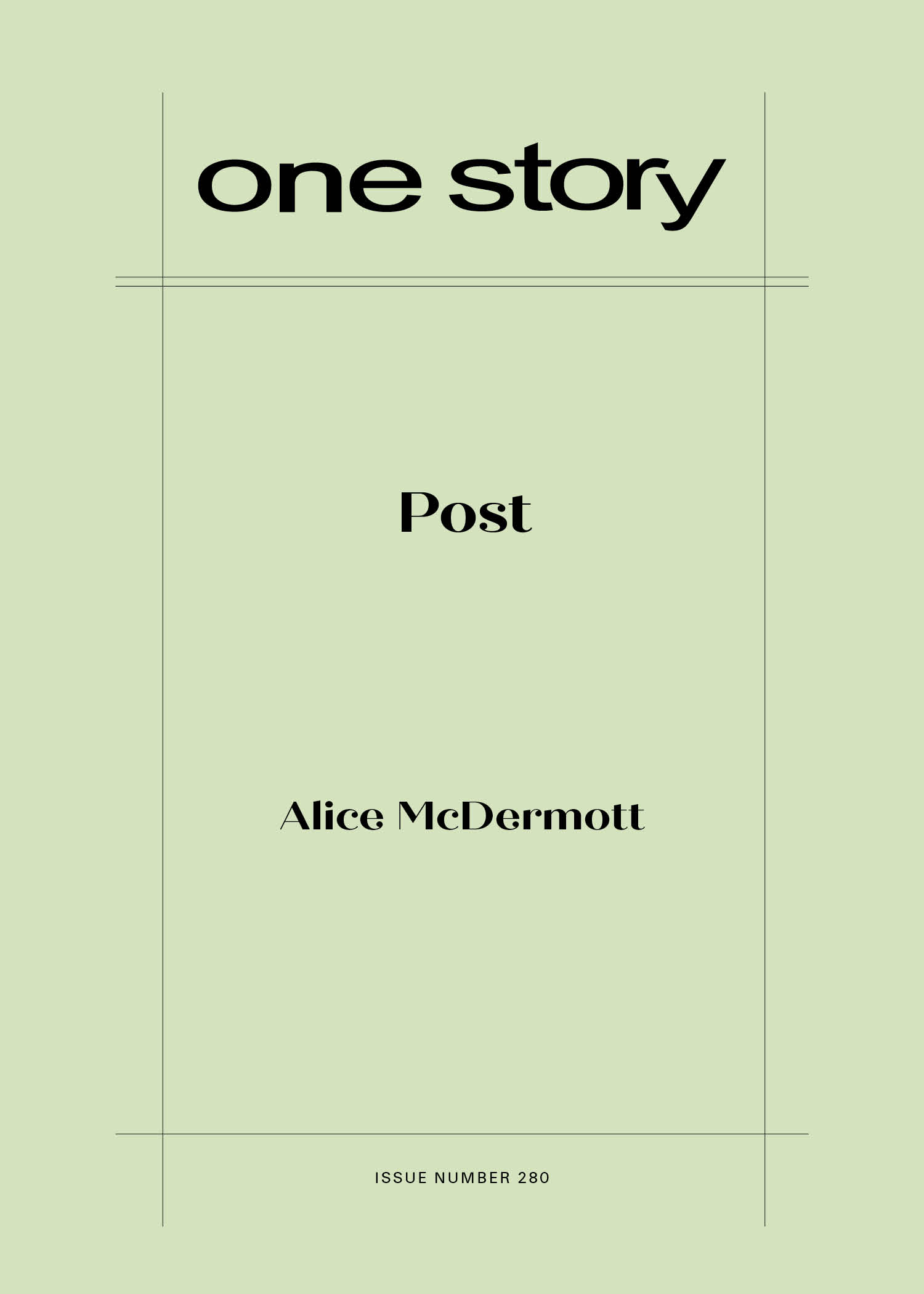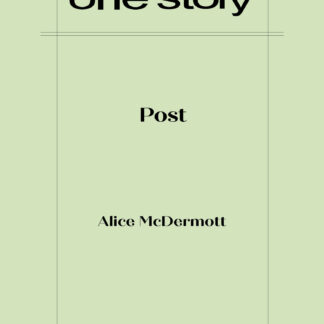
Post
$2.50
101 in stock
Excerpt
“Maybe brimstone,” Mira said. “Smokey, cloying. Tincture of something rotten. Flesh, maybe.”
Adam paused. Pulled down his mask, sniffed the air. He had a lovely nose. Small and neat, slightly pinched. Pale, even delicate, above the black face mask and the auburn indications of his patchy beard. She had told him this once, that she loved his nose. He’d said, “Only cartilage.”
He readjusted the mask. His eyes were smiling. His eyes were now all she had to go on.
“It smells like pot,” he said. “Same as ever.”
She had brought him to this corner of the park as if to share a new, as yet undiscovered view. But it was all familiar to them both: the yellowed grass of the softball field, its ring of pathways and benches and scattered trees, the motley apartment buildings all round the periphery, made to seem distant by the open space. It was March, and although the air still held its winter chill, a wan sun had brought people outside. Runners and bicyclists—she could hear them struggling for breath as they passed, everyone grown heavier, out of shape—small, hellbent children on scooters, and couples with strollers: sleeping pandemic babies or tentative toddlers holding out their little hands, feeling the cold breeze on their palms—their first encounter with the wind, no doubt. A revelation after a life-thus-far all indoors.
Alice McDermott
Alice McDermott is the author of several novels, including The Ninth Hour, Someone, After This, Child of My Heart, Charming Billy, winner of the 1998 National Book Award; and At Weddings and Wakes—all published by FSG. That Night, At Weddings and Wakes, and After This were all finalists for the Pulitzer Prize. Her stories and essays have appeared in The New York Times, The Washington Post, The New Yorker, Harper’s Magazine, and elsewhere. For more than two decades she was the Richard A. Macksey Professor of the Humanities at Johns Hopkins University and a member of the faculty at the Sewanee Writers Conference. McDermott lives with her family outside Washington, D.C.
Patrick Ryan on “Post”
Near the beginning of the lockdown in New York City, I thought about all the lonely people who suddenly were having to confront a whole new kind of loneliness. I also thought about all the couples living in all those apartments who were having to redefine their notions of cohabitating. Perhaps most often—and this might sound strange, but it was a pretty strange time—I thought about those cohabitating couples who’d been on the verge of breaking up when the lockdown began, and how any plans to break up had to be shelved (along with all the rest of one’s plans), and what that must have looked like when added to the other stress, worry, and general discontent that comes with a pandemic. Ticking time bombs! I thought. Huge fights! Murders! I could foresee the day Netflix would run dry and was, perhaps, pre-seeding my desire for other people’s drama.
Leave it to Alice McDermott to imagine a lockdown scenario of compassion—of love, even—between two people who have already drifted apart yet have chosen to lock down together. Mira and Adam are recent exes living in Brooklyn when the pandemic turns life on its head. While social distancing, by necessity, is driving so many people apart, they manage, temporarily, to come back together—not as a couple, not as anything romantic, but as a kind of two-person care unit. One of the many things I love about this story is that it’s about a pair of exes, yet it contains not a single argument about their shared past, not a single zinger, not even a single regret. It’s a love story about ex-lovers who are not attempting to reconcile. In the canon of great stories about exes, “Post” deserves an honored position. One Story is proud to present to you this brilliant new piece of fiction by the one and only Alice McDermott.
Q&A by Patrick Ryan
- PR: Where did the idea for this story come from?
- AM: I began this story as a homage to Katherine Anne Porter’s brilliant Pale Horse, Pale Rider. I’ve loved Porter’s story for decades and found the language of it, especially its ending, coming back to me again and again in the early days of the pandemic. It’s the story of two young people falling in love in the midst of the 1918 flu epidemic and the First World War—a wonderfully clear-eyed, utterly devastating tale. “Post” is a case of imitation being the highest form of flattery.
- PR: How long did it take you to finish a draft you were happy with?
- AM: Happy? Never. Satisfied is good enough. Satisfied that the story became something I hadn’t anticipated at the start and that the characters came into their own and that the story’s end—that muffled, masked kiss—seemed both inevitable (plot wise) and appropriate (image wise) to the lonely devastation of this particular pandemic. I continue to be amazed at how muted our collective response to this scourge has been: so little opportunity for public mourning, for national grief, so little passion evoked by this stark reminder of our—all of us—mortality. Clearly, the weird politics of the moment has much to do with this, but I wonder, too, if we’ve lost some ability to appreciate one another’s suffering, or if we’ve lost the language for any confrontation with the abyss. It sometimes seems we can only shrug, turn away, court distraction, resort to memes . . . But to answer the question (sorry): I wrote this story fairly quickly—over the course of a few months, which is quick for me.
- PR: Pandemic fiction—or Coronavirus fiction, specifically—is a fairly recent development in the world of literature. When you embarked on “Post,” had you already been reading fiction that examined lockdown life, or were you exploring territory you hadn’t seen fictionalized before?
- AM: You’re right, Coronavirus fiction is as novel as the virus itself, although pandemic fiction is not. Lockdown had me rereading Porter’s story, but also books like A Journal of the Plague Year, and Poe’s “Masque of the Red Death,” and Saramago’s Blindness, Emily St. John Mandell’s Station Eleven, Maggie O’Farrell’s Hamnet.
- PR: This is a particularly nerdy question: “Post” switches back and forth between the recent past and what is essentially the present. Many writers would have opted to write the present sections in the present tense, and the recent past sections in the past tense. But “Post” is written entirely in the past tense. Can you talk a little about your decision to write it that way?
- AM: Even as the story was being composed, I was aware of time working on it. The present section of the story takes place in March of 2021, vaccinations were just revving up, the Delta variant wasn’t yet an issue here, masks had not been discarded—no less mandated for a second time. I suppose it’s the risk any “timely” story runs: the present evaporates, becomes the past, even as we try to make a record of it. Past tense, what always strikes me as the natural, oral, story-telling tense, seemed necessary for this story’s very fleeting “present.” Also—a bias of my own—present tense often indicates to me a bit of writerly self-consciousness. I love it when it works, but I’m always wary. The last thing I wanted for this very topical story was a self-aware litterateur getting in the way of the characters themselves.
- PR: Do you think “Post” will be your only pandemic story? Or might there be others down the line?
- AM: Early in the pandemic an interviewer asked me who I thought might write the great Coronavirus novel. I’m afraid I filled the poor guy with dismay when I said the author of the great Coronavirus novel probably hasn’t been born yet. Tincture of time seems necessary here. But who knows?
- PR: Can you tell us a little about your craft-of-writing book, What About the Baby?, that comes out this month?
- AM: These are lectures and brief essays collected over my years of teaching—and pontificating—about writing and reading. A bit of “how-to,” a bit of “why not?” a lot of, “read this!” But, mostly, I hope, it’s a book about the power and the pleasure, as well as the necessity, of the literary arts. Necessary especially when we find our response to the suffering of others—or to the abyss, or to joy, or to love itself—has grown muffled, masked. (See above.)
- PR: What are you working on now?
- AM: Two novels. Always two novels.
